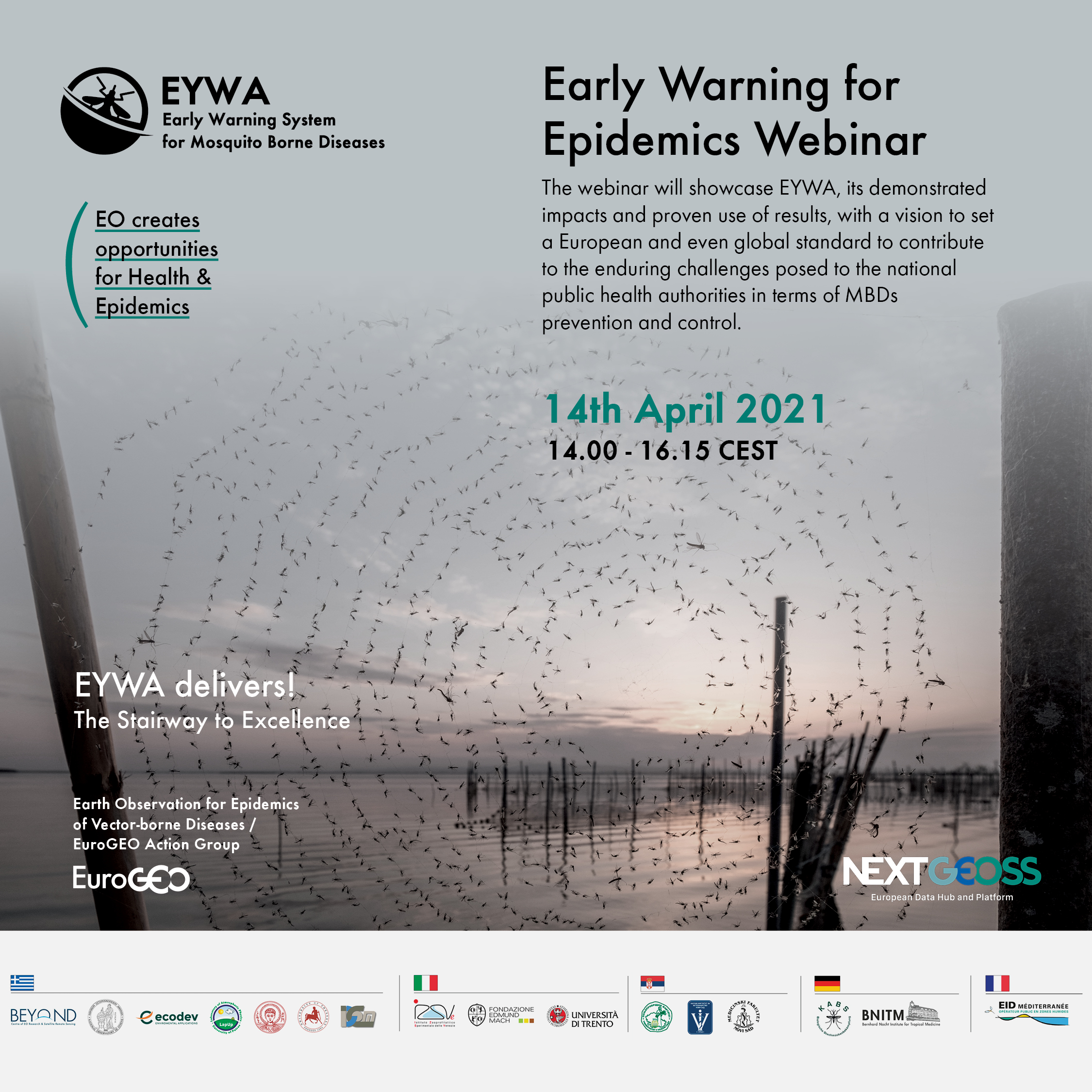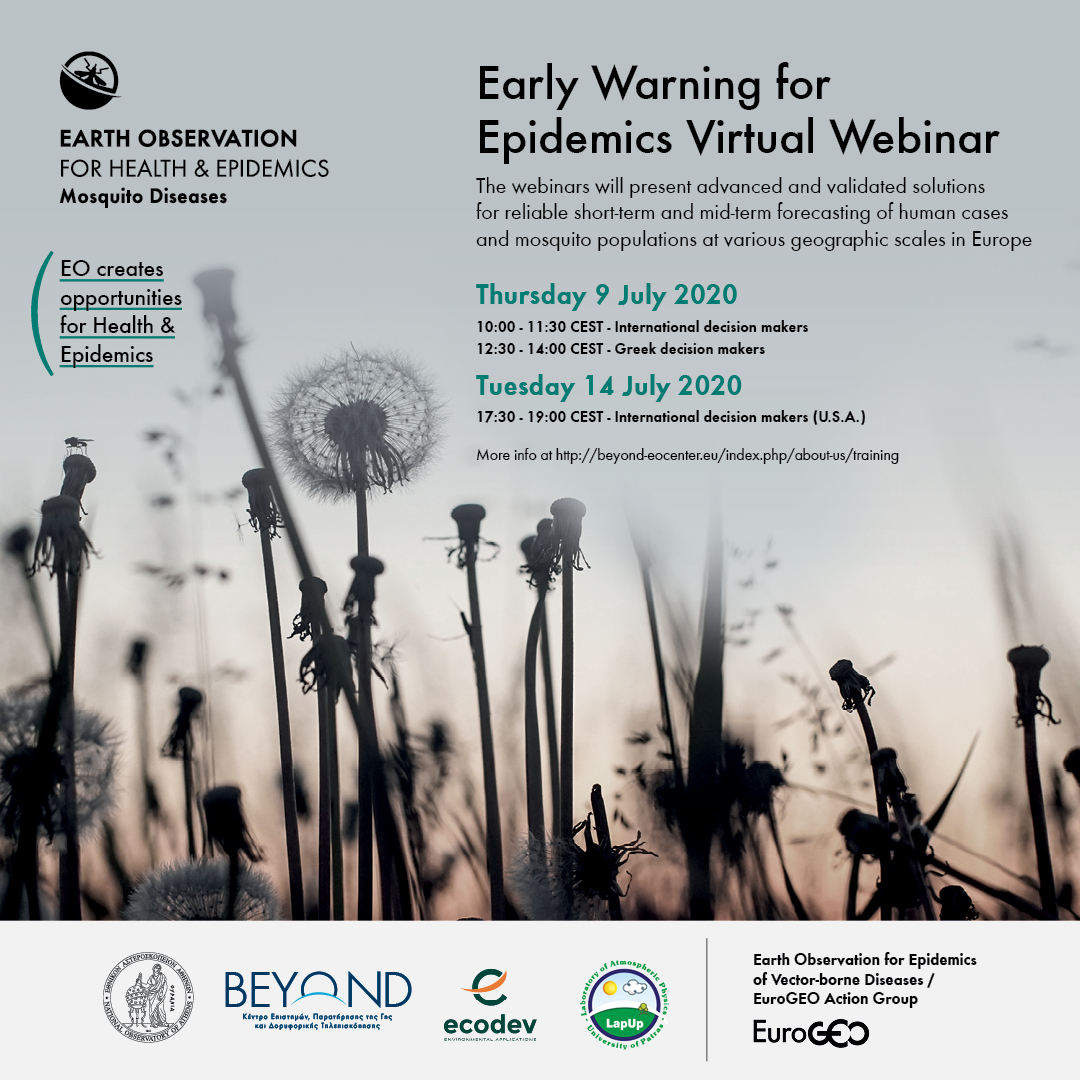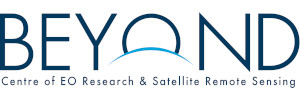 EYWA (EarlY WArning System for Mosquito borne diseases) a prototype system addressing the critical public health need for prevention and protection against the Mosquito-Borne Diseases (MBDs), lies under the umbrella of EuroGEO Action Group "Earth Observation for Epidemics of Vector-borne Diseases - EO4EViDence" and is the outcome of the co-development between the BEYOND Centre of EO Research and Satellite Remote Sensing of the National Observatory of Athens, the Ecodevelopment S.A., the Laboratory of Atmospheric Physics of the University of Patras, and 12 more interdisciplinary European organisations from Italy, France, Germany and Serbia.
EYWA (EarlY WArning System for Mosquito borne diseases) a prototype system addressing the critical public health need for prevention and protection against the Mosquito-Borne Diseases (MBDs), lies under the umbrella of EuroGEO Action Group "Earth Observation for Epidemics of Vector-borne Diseases - EO4EViDence" and is the outcome of the co-development between the BEYOND Centre of EO Research and Satellite Remote Sensing of the National Observatory of Athens, the Ecodevelopment S.A., the Laboratory of Atmospheric Physics of the University of Patras, and 12 more interdisciplinary European organisations from Italy, France, Germany and Serbia.
EYWA supports sustainability by addressing the relevant priorities of the GEO Societal Benefit Areas, the Agenda 2030 and the Sustainable Development Goals (SDGs), such as Good Health and Well-Being (SDG 3) and Climate Action (SDG 13) and Sustainable cities and communities (SDG 11).
The system is based on a plethora of satellite and in-situ Earth Observation data and state-of-the-art technological tools, leveraging scientific knowledge and ultimately proving that EO can upend our understanding in the field of epidemics. The pivotal role of EYWA is to become a key lever for Public Health authorities and decision makers, support preparedness and timely strategic design of the health system response actions, and raise citizens awareness on the expected risk, with a view to fight Mosquito-Borne Diseases.
In this context and as a continuation of the first webinars hosted on June 9th & 14th 2020, we are organising a virtual workshop for "Early Warning for Epidemics", which will take place in April 14th, 2021.
This workshop aims to reach members of the Mosquito-Borne Diseases and Earth Observation related communities, Public Health authorities and decision makers to showcase EYWA, its demonstrated impacts and proven use of results through selected use cases. The vision is to contribute to the process towards setting a European and even global standard for early warning and decision support to help reduce MBDs infections and prevent outbreaks along with the enduring challenges posed to the European national public health authorities in terms of MBDs prevention and control.
| Location | To join please click here |
| Date: | 14/04/2021 |
| Time: | 14.00-16.15 CEST |
| Facilitator: | NOA |
Agenda items
| 14:00 – 14:15 |
Welcome & Introductions Speakers Dr. Haris Kontoes (BEYOND – National Observatory of Athens) Steven Ramage (Group on Earth Observations- GEO) |
| PART I | The challenge – The EYWA solution |
| 14:15 - 14:25 |
“'Infectious diseases in a globally changing environment” Keynote speaker: Dr. Nikolaos Stilianakis (JRC – Joint Research Centre) |
| 14:25 - 14:40 |
“EYWA: A key tool to the epidemics arsenal” Speaker: Dr. Haris Kontoes (BEYOND – National Observatory of Athens) |
| PART II | Operational implementation of EYWA |
| 14:40 - 14:55 |
“Reliability of early warning signals in WNV predictions” Speaker: Dr. Ioannis Kioutsioukis (University of Patras, Laboratory of Atmospheric Physics) |
| 14:55 - 15:10 |
“Operational use of EYWA in Greece” Speaker: Dr. Spiros Mourelatos (Ecodevelopment S.A.) |
| PART III | EYWA in Europe |
| 15:10 - 15:20 |
“Vector Control Strategies Against West Nile Virus Infection in Serbia” Speaker: Dr. Dušan Petrić (UNSFA - University of Novi Sad, Faculty of Agriculture, Laboratory for Medical and Veterinary Entomology) |
| 15:20 - 15:30 |
“WNV in Germany: potential implementation of EYWA for targeted monitoring and vector control by KABS” Speaker: Dr. Daniel Wohlgemuth (KABS - Kommunale Aktionsgemeinschaft zur Bekämpfung der Schnakenplage) |
| 15:30 - 15:40 |
“Entomological situation and arboviruses transmissions in Southern France” Speaker: Grégory L’Ambert (EID Méditerranée) |
| PART IV | Policy framework & Actions for MBDs in Europe |
| 15:40 - 15:50 |
“Discovery, ecology and evolution of novel and emerging/re-emerging arboviruses” Speaker: Prof. Dr. Dr. Jonas Schmidt-Chanasit (BNITM - Bernhard Nocht Institute for Tropical Medicine) |
| 15:50 - 16:00 |
"Early Warning System at European Union level: policy framework and operational role" Speaker: Olimpia Imperiali (DG ECHO - Directorate-General for European Civil Protection and Humanitarian Aid Operations, European Commission) |
| 16:00 - 16:15 | Questions & Discussion |
The Webinar is available in Youtube https://youtu.be/SKqHgGfUlEI
Early Warning for Epidemics Webinar using dynamic models, AI and space technology

Mosquito-Borne Diseases (MBDs) infect almost 700 million people every year and are recognized in over 100 countries, causing millions of deaths annually. The changing climatic and ecological conditions, global travel and trade, human behavior, as well as the rapid and unplanned urbanization, are key factors that influence the seasonal and geographic distribution of vectors' population and therefore the transmission of the pathogens, causing the re-emerging and even more emerging of these diseases in countries where they were previously unknown. West Nile Virus (WNV) infection in humans and animals have been recorded in various areas of Greece, during the years 2010-2014 and 2017-2019, but also in other regions in Europe reaching a usually high record in 2018.
The BEYOND Centre of EO Research and Satellite Remote Sensing of the Institute for Astronomy, Astrophysics, Space Applications and Remote Sensing (IAASARS) of the National Observatory of Athens, in collaboration with the leading company in mosquito control and data analytics Ecodevelopment S.A., Laboratory of Atmospheric Physics of the University of Patras - Physics Department, and along with several European organisations from Italy, France, Germany and Serbia, that serve research purposes, perform mosquito control activities, belong to health and decision making sectors, has seized the initiative to develop an Early Warning System for combating the West Nile Virus.
The pivotal role of the system is to inform decision makers, help them improve health system responses, inform citizens and combat mosquitoes, with the prospect of organizing strategic intensifying actions of the entomological and epidemiological surveillance and take preventive measures to curtail the spread of WNV in Europe.
Furthermore, NOA/BEYOND is coordinating the EuroGEO Action Group "Earth Observation for Epidemics of Vector-borne Diseases" which is linked to the GEO 2017-2019 Work Programme, especially with the Community Activities: Earth Observations for Health (EO4HEALTH) which includes vector borne infectious diseases, Copernicus Atmospheric Monitoring Service (CAMS) and Copernicus Climate Change Service (C3S). Our recently launched initiative supports the relevant priorities of the Sustainable Development Goals (SDGs) such as good health and well-being (SDG 3) and climate action (SDG 13).
In this context, we are organising a one-day virtual workshop for "Early Warning for Epidemics" which will take place in July 9th and 14th, 2020.
This workshop aims to reach members of the vector-borne diseases, epidemics communities and decision makers, bring together interdisciplinary teams across the entire value chain, and demonstrate through selected use cases the value provided by the advanced European scientific and technological assets towards the development of robust, reliable, scalable, and replicable system solutions to combat mosquito-borne diseases using EO space technologies and AI. The webinars will present advanced and validated solutions for reliable short-term and mid-term forecasting of human cases and mosquito populations at various geographic scales in Europe.
Please confirm your participation at This email address is being protected from spambots. You need JavaScript enabled to view it.
EYWA's presentation is available here.

